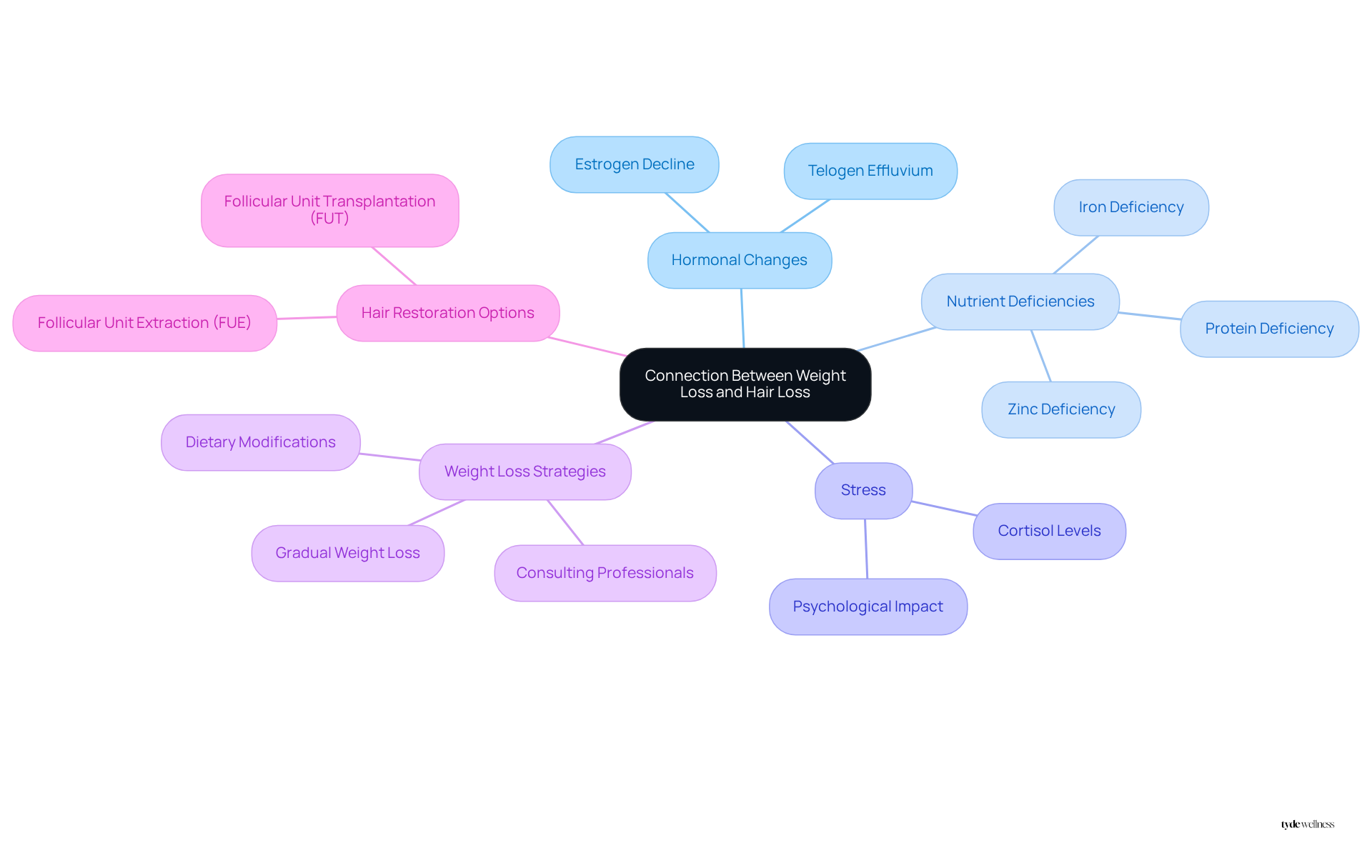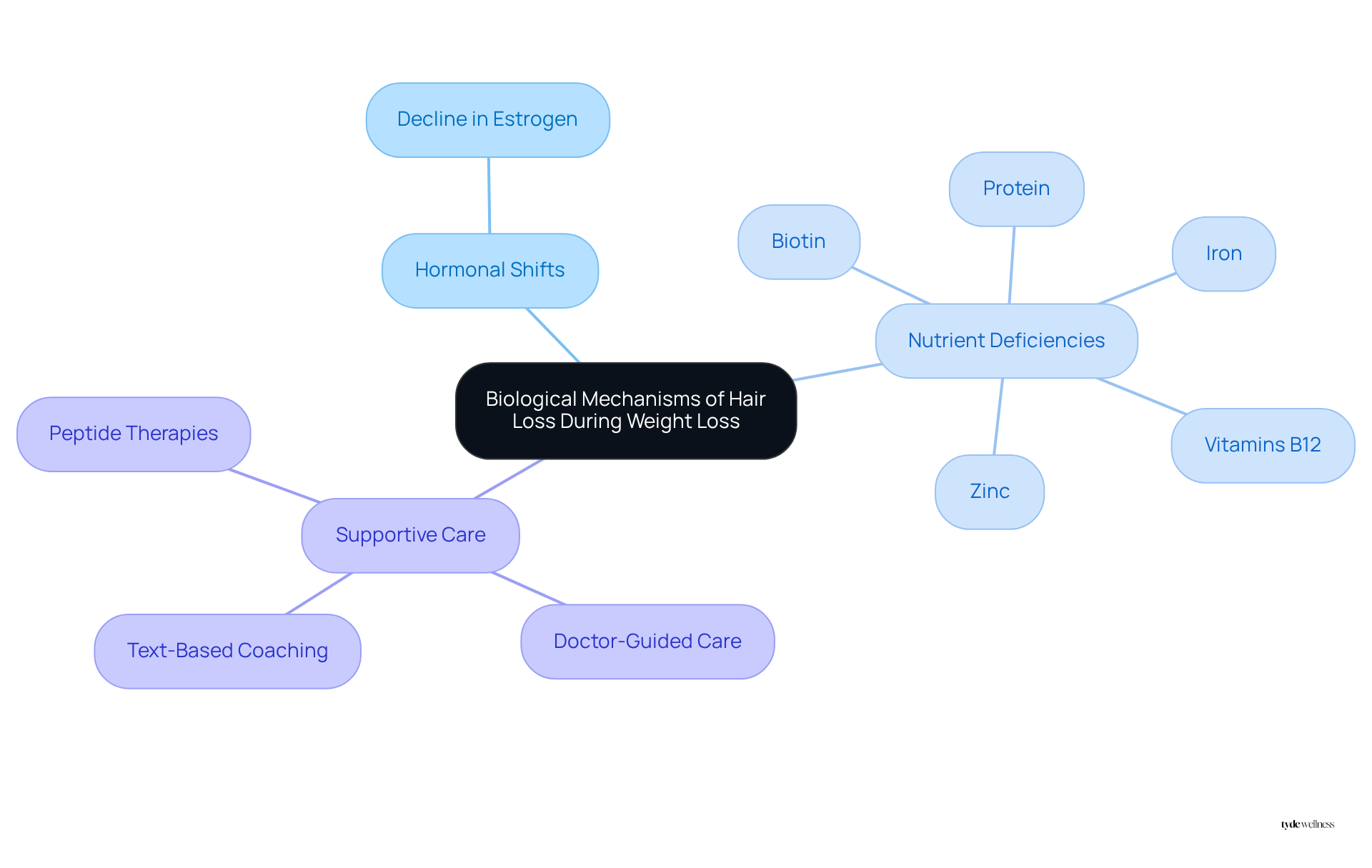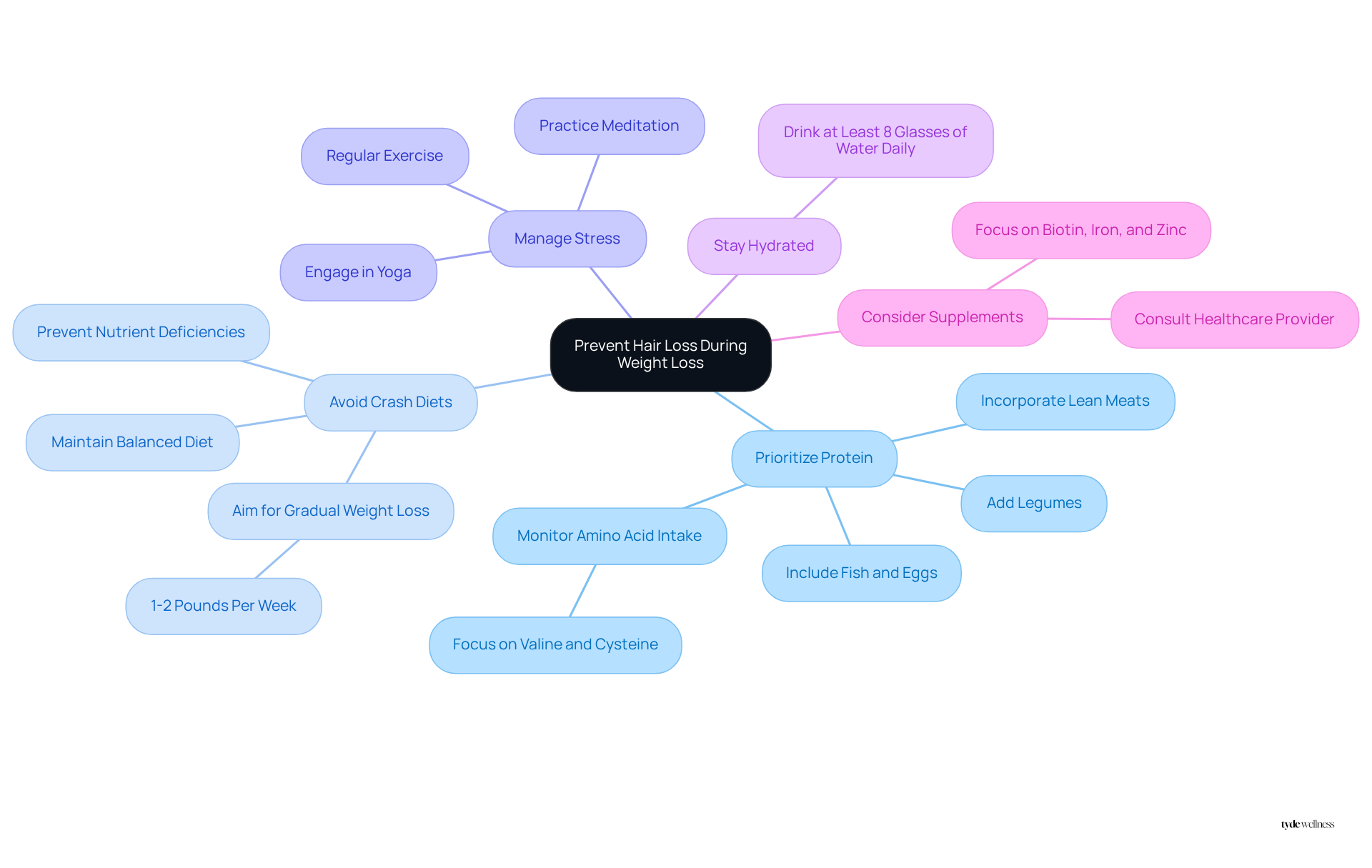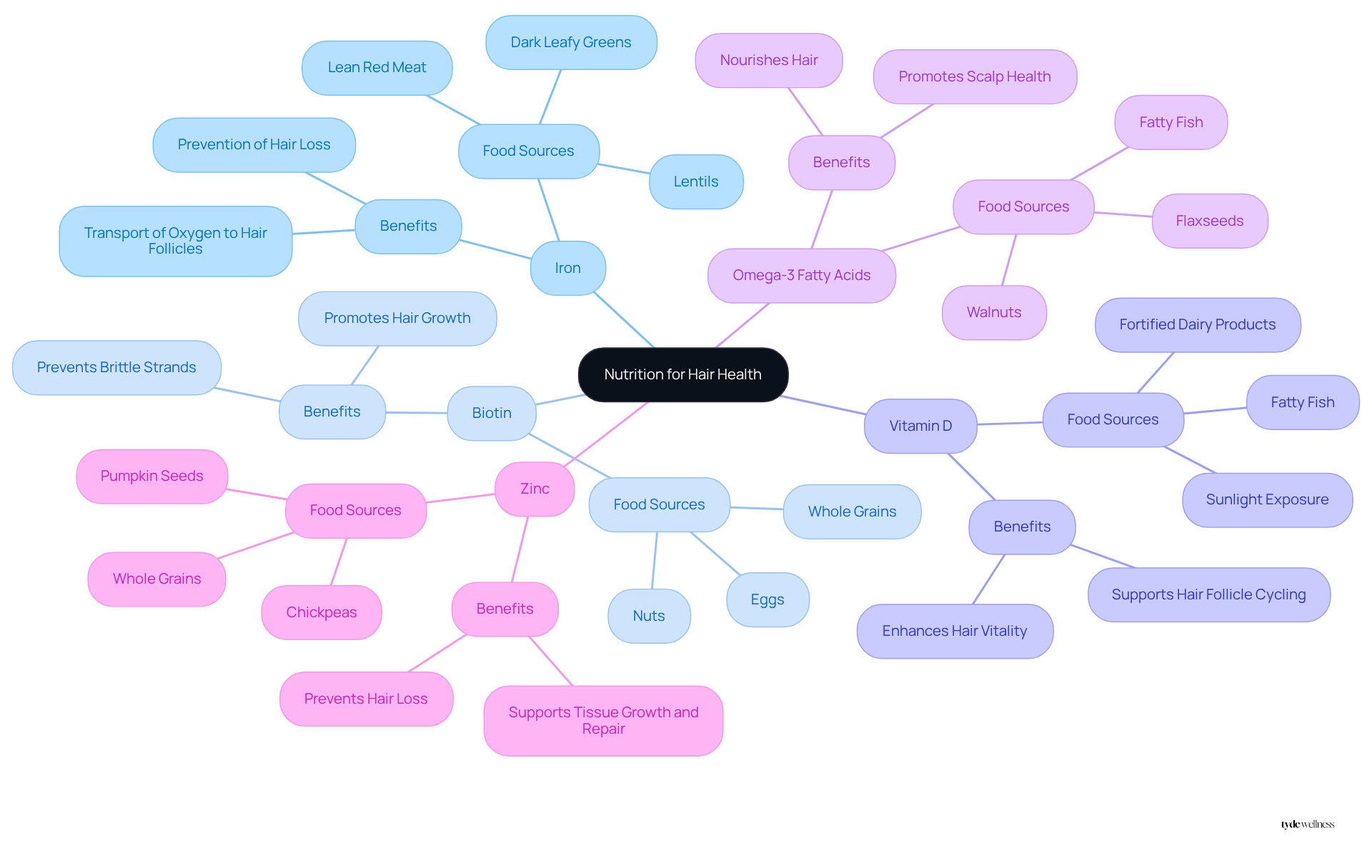Overview
The article discusses essential strategies for women to prevent hair loss while losing weight, emphasizing the importance of gradual weight reduction and proper nutrition. It highlights that rapid weight loss can trigger hormonal changes and nutrient deficiencies that contribute to hair thinning. Furthermore, it recommends focusing on a balanced diet rich in protein, iron, and other vital nutrients to support hair health during the weight loss journey.
Introduction
The intricate relationship between weight loss and hair health presents a significant challenge for many women, often resulting in unintended consequences such as hair thinning or loss. As hormonal shifts and nutritional deficiencies become more common during the weight reduction process, understanding how to navigate these changes is essential for maintaining both physical appearance and overall well-being.
What strategies can women adopt to ensure that their pursuit of a healthier weight does not compromise their hair? This article explores effective methods to prevent hair loss while losing weight, empowering women to achieve their health goals without sacrificing their hair vitality.
Explore the Connection Between Weight Loss and Hair Loss
The condition of hair can be significantly influenced by factors such as hair loss and losing weight, especially for women, due to hormonal changes, nutrient deficiencies, and stress. A rapid decrease in weight often leads to hair loss and losing weight, as it triggers telogen effluvium, a condition where hair follicles prematurely enter the shedding phase. This situation is exacerbated by the stress associated with hair loss and losing weight, which can elevate cortisol levels and disrupt the hair growth cycle, leading to increased shedding. Research indicates that women are especially vulnerable to this condition, experiencing hair loss even with less drastic weight reductions compared to men.
Health experts emphasize the importance of a gradual weight loss approach, ideally 1-2 pounds per week, to minimize bodily shock and reduce the risk of hair loss and losing weight. GLP-1 medications, such as those available at Tyde Wellness, can aid this process by curbing appetite and improving metabolic function, fostering a more sustainable path toward achieving a healthier body. Nutritional deficiencies, particularly in iron, zinc, and protein, are common during instances of hair loss and losing weight, which can further compromise scalp health. For instance, iron deficiency is a critical factor in hair follicle thinning, as it is essential for oxygen delivery to the follicles.
In cases where hair thinning becomes pronounced, consulting a healthcare professional is crucial. They may suggest dietary modifications or supplements to rectify deficiencies. If hair thinning persists despite these interventions, advanced restoration treatments, including Follicular Unit Extraction (FUE) or Follicular Unit Transplantation (FUT), can provide a lasting solution. These procedures involve transplanting healthy hair follicles to areas experiencing thinning or baldness, resulting in a natural and permanent restoration of hair density.
Understanding the is vital for women embarking on their weight loss journeys, empowering them to take proactive steps to protect their hair while achieving their health goals. Furthermore, although hair thinning is not officially recognized as a side effect of Ozempic by the FDA, many users report experiencing it. At Tyde Wellness, we are dedicated to offering the resources and support necessary for women to effectively navigate these challenges. As a Tyde Circle member, you also gain access to exclusive benefits, including program discounts and early access to wellness research, tools, and strategies, enhancing your journey toward sustainable health.

Understand the Biological Mechanisms Behind Hair Loss During Weight Loss
Hair loss and losing weight are significantly influenced by hormonal shifts and nutrient deficiencies during reductions in body mass. As women undergo reductions in body mass, particularly through restrictive diets, they often experience a decline in estrogen levels, a hormone essential for healthy hair growth, which can lead to hair loss and losing weight. This hormonal alteration can result in hair loss and losing weight. Additionally, rapid reductions in body mass can frequently result in deficiencies of vital nutrients such as protein, iron, zinc, and vitamins B12 and biotin, all of which are critical for preventing hair loss and losing weight.
At Tyde Wellness, our board-certified obesity medicine providers offer doctor-guided care tailored to your individual needs, ensuring that your weight loss plan includes essential nutrition to support both your overall health and hair maintenance. Our text-based coaching and support allow you to reach out to your wellness coach anytime, anywhere, providing continuous guidance throughout your journey. Furthermore, optional peptide and hormonal therapies can aid in improving recovery and energy levels, addressing hormonal changes that may impact scalp health.
For instance, a 2021 study revealed that nearly 75% of women experienced thinning after sleeve gastrectomy, highlighting the prevalence of nutrient deficiencies among those undergoing significant weight loss. Understanding these biological processes, including the concept of , empowers women to make informed dietary choices that not only support their goals of hair loss and losing weight but also promote overall health. By focusing on a balanced intake of essential nutrients and utilizing our ongoing support and personalized maintenance programs, women can mitigate the risk of hair loss and losing weight while achieving their wellness objectives.

Implement Effective Strategies to Prevent Hair Loss During Weight Loss
To prevent hair loss and losing weight simultaneously, women should concentrate on instead of quick dieting. Below are effective strategies to support hair health throughout this process:
- Prioritize Protein: Adequate protein intake is crucial for hair growth. Incorporate lean meats, fish, eggs, and legumes into your meals to ensure you meet your protein needs. Shortages in specific amino acids, such as valine and cysteine, are common among individuals experiencing thinning, making protein an essential part of your diet.
- Avoid Crash Diets: Severe calorie restriction can lead to significant nutrient deficiencies, which may exacerbate follicle thinning. Concentrate on a balanced diet that includes a variety of food groups to sustain overall well-being. Rapid weight loss can lead to hair loss and losing weight can induce telogen effluvium, a temporary condition affecting shedding, underscoring the importance of a gradual approach.
- Manage Stress: Engage in stress-reducing activities such as yoga, meditation, or regular exercise. These practices can mitigate the negative effects of stress on scalp health, which is particularly important during weight loss. As a Tyde Circle member, you can share your experiences and encourage others to adopt these practices, fostering a supportive community.
- Stay Hydrated: Proper hydration is vital for overall health, including the vitality of your hair. Aim to drink at least eight glasses of water daily to support your body’s functions.
- Consider Supplements: Consult with a healthcare provider about the potential benefits of supplements like biotin, iron, and zinc, which are known to promote scalp health. Iron deficiency is one of the primary factors contributing to hair loss and losing weight, especially for women, making it essential to monitor and manage nutrient levels.
By applying these strategies and actively engaging with your community as a Tyde Circle member—sharing insights, offering encouragement, and providing support—women can effectively navigate their weight loss journey while managing the challenges of hair loss and losing weight.

Prioritize Nutrition to Support Hair Health During Weight Loss
Nutrition plays a crucial role in addressing hair loss and losing weight. Key nutrients to prioritize include:
- Iron: This mineral is vital for the transport of oxygen to hair follicles. Iron deficiency is common among women who are dealing with hair loss and losing weight. To boost your intake, incorporate sources such as , lentils, and lean red meat.
- Biotin: An essential B-vitamin, biotin promotes hair growth and can be found in foods like eggs, nuts, and whole grains. Ensuring sufficient biotin levels is crucial, as deficiencies can lead to brittle strands and increased shedding.
- Vitamin D: Important for the cycling of hair follicles, vitamin D can be obtained from fatty fish, fortified dairy products, and sunlight exposure. Maintaining optimal levels supports the overall vitality of hair.
- Omega-3 Fatty Acids: These beneficial fats nourish hair and promote scalp health. Incorporating fatty fish, flaxseeds, and walnuts into your diet can improve the condition of your hair.
- Zinc: Essential for tissue growth and repair, zinc can be sourced from pumpkin seeds, chickpeas, and whole grains. A deficiency in zinc may contribute to hair loss and losing weight, making it essential to include these foods in your meals.
Furthermore, maintaining hydration is essential for overall well-being and can positively influence the condition of hair. By focusing on these nutrients and ensuring proper hydration, women can effectively enhance their hair health while addressing hair loss and losing weight, fostering a balanced approach to their wellness journey.

Conclusion
Understanding the intricate relationship between weight loss and hair health is essential for women aiming to achieve their wellness goals. This article highlights that rapid weight loss can lead to hair loss due to hormonal changes, nutrient deficiencies, and increased stress levels. By adopting a gradual approach to weight loss, women can mitigate these risks, ensuring their journey towards a healthier body does not compromise their hair’s vitality.
Key strategies include:
- Prioritizing protein intake
- Avoiding crash diets
- Managing stress
- Staying hydrated
- Considering necessary supplements
Each of these elements works synergistically to support not only general well-being but also the specific needs of hair follicles, which can be adversely affected during this process.
Ultimately, addressing the nutritional needs and emotional well-being of women during weight loss is vital. By fostering a balanced approach that incorporates essential nutrients and supportive practices, women can navigate their weight loss journeys while preserving the health of their hair. Taking proactive steps today can lead to a more sustainable and fulfilling path toward achieving both weight loss and hair health goals.
Frequently Asked Questions
How does weight loss affect hair loss?
Rapid weight loss can trigger telogen effluvium, causing hair follicles to prematurely enter the shedding phase, which leads to increased hair loss.
Why are women more affected by hair loss during weight loss compared to men?
Research indicates that women are especially vulnerable to hair loss even with less drastic weight reductions, likely due to hormonal changes and other factors.
What role does stress play in hair loss associated with weight loss?
The stress of losing weight can elevate cortisol levels, disrupting the hair growth cycle and leading to increased shedding.
What is the recommended approach to weight loss to minimize hair loss?
Health experts recommend a gradual weight loss approach of 1-2 pounds per week to minimize bodily shock and reduce the risk of hair loss.
How can GLP-1 medications help with weight loss?
GLP-1 medications can curb appetite and improve metabolic function, promoting a more sustainable path to achieving a healthier body.
What nutritional deficiencies are commonly associated with hair loss during weight loss?
Common deficiencies include iron, zinc, and protein, which are essential for maintaining scalp health and preventing hair follicle thinning.
When should someone consult a healthcare professional regarding hair loss?
Consultation is crucial if hair thinning becomes pronounced, as a healthcare professional can suggest dietary modifications or supplements to address deficiencies.
What advanced treatments are available for persistent hair thinning?
Treatments such as Follicular Unit Extraction (FUE) or Follicular Unit Transplantation (FUT) involve transplanting healthy hair follicles to areas experiencing thinning or baldness.
Does the FDA recognize hair thinning as a side effect of Ozempic?
Hair thinning is not officially recognized as a side effect of Ozempic by the FDA, but many users report experiencing it.
What resources does Tyde Wellness offer to support women facing these challenges?
Tyde Wellness provides resources and support, including exclusive benefits for Tyde Circle members, such as program discounts and early access to wellness research and strategies.
List of Sources
- Explore the Connection Between Weight Loss and Hair Loss
- Hair loss after weight loss: Causes, risks, and prevention (https://medicalnewstoday.com/articles/weight-loss-and-hair-loss)
- Weight Loss and Hair Loss: the Unexpected Connections – Dr. Scott Alexander – Hair Restoration (https://biltmorehairrestoration.com/weight-loss-and-hair-loss)
- Does Ozempic Cause Hair Loss? What We Know (https://health.clevelandclinic.org/does-ozempic-cause-hair-loss)
- Telogen Effluvium Associated With Weight Loss: A Single Center Retrospective Study – PMC (https://pmc.ncbi.nlm.nih.gov/articles/PMC11621640)
- Understand the Biological Mechanisms Behind Hair Loss During Weight Loss
- Hair Loss After Weight Loss | Aglow Dermatology (https://dinastrachanmd.com/blog/uncategorized/managing-hair-loss-after-weight-loss)
- Hair loss after weight loss: Causes, risks, and prevention (https://medicalnewstoday.com/articles/weight-loss-and-hair-loss)
- Hair Loss After Weight Loss: Causes, Risks, Prevention (https://healthline.com/nutrition/weight-loss-and-hair-loss)
- Hair Loss Statistics 2025 (Types, Treatments…) (https://medihair.com/en/hair-loss-statistics)
- The Hidden Connection: How Weight Loss Can Trigger Hair Loss (https://sanguina.com/blogs/blood-health/how-weight-loss-can-trigger-hair-loss)
- Implement Effective Strategies to Prevent Hair Loss During Weight Loss
- Hair Loss After Weight Loss | Aglow Dermatology (https://dinastrachanmd.com/blog/uncategorized/managing-hair-loss-after-weight-loss)
- Hair Loss After Weight Loss: Causes, Risks, Prevention (https://healthline.com/nutrition/weight-loss-and-hair-loss)
- Hair Loss Statistics 2025 (Types, Treatments…) (https://medihair.com/en/hair-loss-statistics)
- Telogen Effluvium Associated With Weight Loss: A Single Center Retrospective Study – PMC (https://pmc.ncbi.nlm.nih.gov/articles/PMC11621640)
- The Hidden Connection: How Weight Loss Can Trigger Hair Loss (https://sanguina.com/blogs/blood-health/how-weight-loss-can-trigger-hair-loss)
- Prioritize Nutrition to Support Hair Health During Weight Loss
- (PDF) Low iron stores: A risk factor for excessive hair loss in non-menopausal women (https://researchgate.net/publication/5894861_Low_iron_stores_A_risk_factor_for_excessive_hair_loss_in_non-menopausal_women)
- Unraveling the Connection Between Weight Loss and Hair Health: Insights and Solutions – Charles, Glenn (charlesmedicalgroup.com) (https://charlesmedicalgroup.com/general/unraveling-the-connection-between-weight-loss-and-hair-health-insights-and-solutions)
- Can Your Diet Affect Hair Loss? – Baton Rouge Clinic (https://batonrougeclinic.com/news-education/hair-falling-out-why-your-diet-may-be-to-blame)
- The Role of Vitamins and Minerals in Hair Loss: A Review – PMC (https://pmc.ncbi.nlm.nih.gov/articles/PMC6380979)
- Guide to Best Vitamins and Minerals for Hair Growth – ISHRS (https://ishrs.org/patients/treatments-for-hair-loss/nutrition-and-vitamins)



